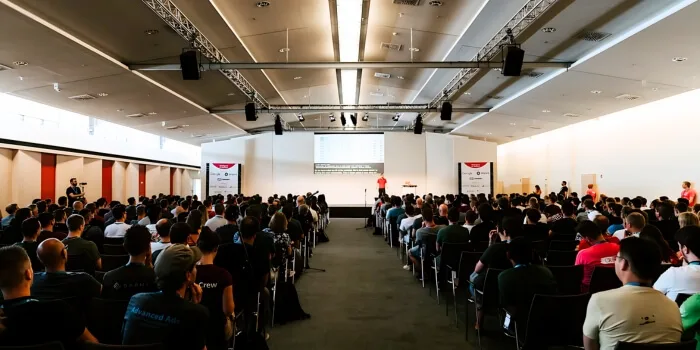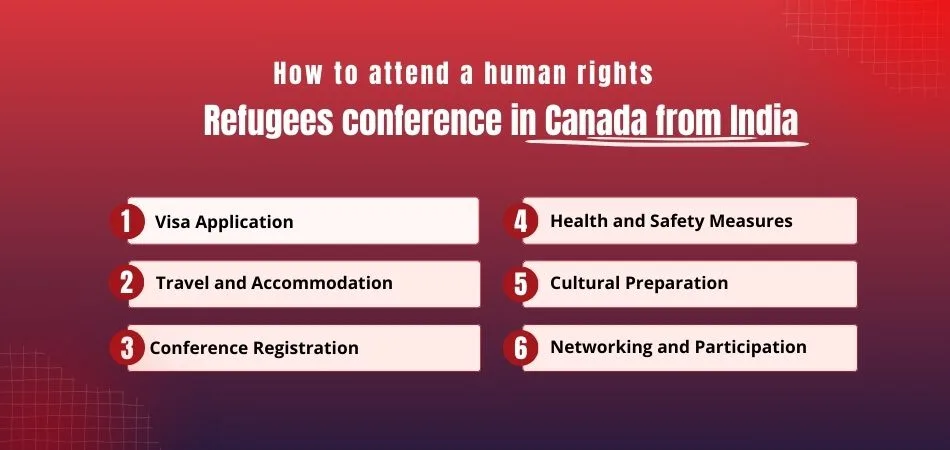Attending a Human Rights and Refugees Conference in Canada from India is an exciting chance to engage with global issues and connect with like-minded professionals. To make the most of this opportunity, careful planning is essential, from securing your visa to organizing travel details.
Start by applying for a Temporary Resident Visa (TRV). You’ll need important documents like an invitation letter from the conference organizers, proof of financial stability, and a valid passport to support your application.
Once your visa is approved, arrange your travel and accommodation. Familiarize yourself with Canadian customs and conference details to ensure a smooth trip. Keep reading to explore more tips on how to attend a Human Rights and Refugees Conference in Canada from India.
Goal of the Conference on Human Rights and Refugees
The primary goal of a Human Rights and Refugees Conference is to address critical issues surrounding the protection and promotion of human rights, particularly for refugees and displaced individuals. These conferences aim to generate meaningful dialogue, share knowledge, and promote international cooperation in tackling the complex challenges that refugees face.
One key objective is raising awareness about human rights violations and the urgent needs of refugees. By bringing together policymakers, activists, academics, and NGOs, these conferences highlight global challenges and encourage action towards resolving them.
For example, when you attend Human Rights and Refugees Conference in Canada, you contribute to discussions that influence policies and promote stronger protections for vulnerable populations.
Another crucial goal is capacity building. Workshops and training sessions provide attendees with practical skills and knowledge to improve their advocacy efforts or improve refugee support services. These conferences also emphasize international collaboration, encouraging cooperation between different organizations and countries to strengthen refugee assistance programs.
Finally, the conference serves as a platform for amplifying refugee voices, allowing those directly affected by displacement to share their experiences, challenges, and hopes for the future. Their stories encourage empathy and shape more inclusive discussions and decisions.
In short, the goal of a Human Rights and Refugees Conference is to unite global efforts to promote and protect the rights of refugees while working towards long-term, sustainable solutions to the challenges they face.
How to Attend a Human Rights and Refugees Conference in Canada from India?
Human Rights and Refugees Conferences in Canada can be transformative for Indians, offering a chance to engage with global issues and connect with like-minded individuals.
If you’re wondering how to attend a Human Rights and Refugees Conference in Canada from India, the process involves several key steps, from securing a visa to making travel arrangements.
Let’s dive into the details to ensure you have a smooth and successful trip.
Step 1: Conference Registration
Registering for the conference in advance is essential to secure your spot and avoid last-minute issues. During the registration process, you’ll likely need to pay any required fees and provide necessary details. Early registration often gives you access to important updates about the event.
Once registered, take time to review the schedule and sessions. Plan which topics and speakers interest you the most. This is also an excellent opportunity to reach out to fellow attendees or speakers for potential networking and collaborations.
Step 2: Visa Application
To attend the conference, your first step is to apply for a Canadian visa. Start by visiting the official Canadian immigration website to review the specific visa requirements. Gather key documents, including your valid passport, proof of financial stability, and an official invitation letter from the conference organizers.
Having all your paperwork in order is essential for a smooth application process. Ensure that all documents are accurate and up-to-date to avoid delays or complications when submitting your visa application.
Step 3: Travel and Accommodation
Once your visa is approved, it’s time to book your flights and accommodation. To save costs, look for deals or discounts on airfare and lodging. Staying near the conference venue is highly recommended for convenience, especially when participating in Human Rights and Refugees Conference events that may require early starts or late finishes.
Also, don’t forget to arrange transportation to and from the airport. Whether it’s a taxi, shuttle, or public transport, planning your travel ahead ensures a smooth, hassle-free trip and gives you peace of mind upon arrival.
 Step 4: Health and Safety Measures
Step 4: Health and Safety Measures
Before attending the conference, it’s essential to stay informed about current health and safety guidelines. Check if any vaccinations or COVID-19 precautions are required for entry into Canada, and be aware of any travel advisories that may affect your journey.
Additionally, consider purchasing travel insurance to cover unforeseen medical expenses or cancellations. This ensures peace of mind and financial protection while traveling, especially during uncertain times. Staying prepared will help you focus on the conference without worry.
Step 5: Cultural Preparation
Cultural preparation is essential when attending a conference in a different country like Canada. Being aware of Canadian customs and etiquette will make your experience smoother and more enjoyable. Be mindful of local practices, such as politeness, respect for personal space, and punctuality, as they are highly valued in Canadian culture.
Additionally, if the conference is held in a French-speaking region like Quebec, learning a few basic French phrases can enhance your interactions. Simple greetings or expressions of gratitude in the local language show respect and help you connect with others more easily.
Step 6: Networking and Participation
To make the most of your conference experience, it’s essential to actively participate in sessions and networking events. Engage with speakers, ask questions, and contribute to discussions. Your presence and input can help you gain valuable insights and create meaningful connections with other attendees.
Networking is key to expanding your professional circle. Bring business cards and be ready to discuss your work, passions, and goals with others. These conversations could lead to future collaborations or opportunities that enhance your role in the human rights space.
These steps will help you attend a Human Rights and Refugees Conference in Canada from India. It’s an opportunity to broaden your horizons, gain valuable insights, and contribute to meaningful global discussions. Is this an exciting journey for you?
What are the Different Types of Human Rights and Refugees Conferences?
Interested in learning more about Human Rights and Refugees Conferences? These events come in various formats, each with a distinct focus and approach to addressing critical issues. Let’s dive into some common types.
Academic Conferences
These conferences are often held by universities or research institutions. They focus on conference research presentations, scholarly discussions, and debates on human rights and refugee issues. Attendees include academics, students, and researchers who share their latest findings and theories.
Advocacy Conferences
Organized by NGOs, advocacy groups, or international organizations, these conferences promote human rights and refugee issues. Keynote speeches, workshops, and campaign launches emphasize activism and policy change.
Networking Conferences
These events are designed to connect professionals, volunteers, and organizations working in the field of human rights and refugee assistance. Networking conferences provide a platform for sharing resources, forming partnerships, and collaborating on projects.
Educational Conferences
Focused on raising awareness and educating the public, these conferences include seminars, panel discussions, and interactive sessions. The aim is to spread knowledge and inspire empathy for human rights and refugee issues among students, educators, and community members.
Each of these conferences contributes to human rights and refugee protection. Would you like to explore these diverse opportunities?
Who Can Attend Human Rights and Refugees Conferences?
Do you know who attends Human Rights and Refugees Conferences? The events bring together a wide range of individuals and organizations dedicated to refugee and human rights.
Let’s look at some of the key attendees.
Activists and Advocates
Passionate individuals who work tirelessly to promote human rights and support refugees often attend these conferences. They share their experiences, learn from others, and collaborate on advocacy campaigns.
NGO Representatives
Non-governmental organizations (NGOs) play a crucial role in addressing human rights and refugee concerns. Representatives from these organizations attend conferences to discuss their work, network with partners, and seek funding opportunities. Additionally, joining Human Rights and Refugees Conference provides NGOs the chance to collaborate on global solutions.
Academics and Researchers
Scholars and researchers who study human rights and refugee issues contribute their knowledge and insights at these conferences. They present their findings, engage in debates, and collaborate on research projects.
Policymakers and Government Officials
Conferences provide a platform for policymakers and government officials to discuss legislation, policies, and strategies related to human rights and refugees. Actionable policies can only be developed with their participation.
Refugees and Affected Individuals
Their firsthand experiences and perspectives are invaluable. Conferences offer them a voice to share their stories, highlight their challenges, and advocate for their rights and needs.
Human Rights and Refugees Conferences are rich and impactful because of individual perspectives and expertise. Join this diverse community and make a difference!
Can You Attend a Human Rights and Refugees Conference in Canada from India?
Attending a Human Rights and Refugees Conference in Canada from India is an exciting opportunity to engage in meaningful discussions and contribute to global change. However, several important factors must be considered to ensure a smooth experience. Here are the key aspects to keep in mind.
Visa Requirements
To attend a conference in Canada, you will need a Temporary Resident Visa (TRV). Begin by obtaining an official invitation from the conference organizers and gathering all necessary documents, including proof of financial stability, a valid passport, and a detailed travel itinerary. It’s essential to start the visa application process well in advance, as it can take several weeks.
Conference Registration and Fees
Be sure to register for the conference early, as many events offer reduced fees for early registrants. Confirm all the registration details, such as your attendance and any workshops or breakout sessions you wish to join. Some conferences may offer virtual attendance options if traveling is difficult.
Financial Planning
Attending an international conference involves costs such as flights, accommodation, meals, and the visa application fee. Ensure that you have a budget in place, and explore possible scholarships or sponsorship opportunities that could help offset the expenses.
Health and Travel Insurance
It’s highly recommended to purchase travel and health insurance for your trip. This will cover any unexpected medical emergencies, trip cancellations, or lost luggage during your travel.
By carefully considering these factors, you’ll be well-prepared to attend a Human Rights and Refugees Conference in Canada from India, gaining valuable insights and connections while contributing to global advocacy efforts.
Advantages of Attending a Human Rights and Refugees Conference in Canada from India
A Human Rights and Refugees Conference in Canada can be an enjoyable experience from India. It’s an opportunity to immerse yourself in global dialogue, gain new perspectives, and make meaningful connections.
Here are some of the key benefits:
- Global Networking: Connect with activists, academics, and professionals from around the world, expanding your professional network and collaboration opportunities.
- Knowledge Exchange: Learn about the latest research, policies, and practices in human rights and refugee issues, enhancing your understanding and expertise.
- Cultural Exposure: Experience the diverse culture of Canada, from its vibrant cities to its stunning landscapes, enriching your personal and professional growth.
- Advocacy Opportunities: Discover new ways to advocate for human rights and support refugees, gaining insights into effective strategies and initiatives.
- Personal Development: Engage in discussions and workshops that challenge your thinking and inspire action, contributing to your personal and professional development.
When you attend Human Rights Conferences in Canada from India, you open doors to new possibilities. You contribute to shaping a more just and equitable world. Ready to make a difference?
Frequently Asked Questions
Attending a Human Rights and Refugees Conference in Canada from India can be a rewarding experience, but it’s natural to have questions before setting out on this journey. Here are some frequently asked questions that might help guide you through the process:
What is the best time to apply for a Canadian visa for the conference?
It’s best to apply for your visa at least 2-3 months before the conference date. This ensures you have enough time to complete the process and resolve any potential issues or delays that might occur.
What documents do I need to apply for the visa?
You will need an invitation letter from the conference, a valid passport, proof of financial means, and details of your travel itinerary. Providing all necessary documents upfront ensures a smoother visa application process.
Is there a specific visa category for attending conferences in Canada?
Yes, you will apply for a Temporary Resident Visa (TRV) for short stays like attending a conference. Make sure to clearly state the purpose of your visit in your application and include the invitation from the conference organizers.
What kind of accommodation should I consider for the conference?
Many conferences partner with local hotels to offer discounted rates for attendees. Check with the organizers for recommended options. Alternatively, you can look for budget-friendly accommodations like hostels or Airbnb, depending on your preferences and budget.
Can I extend my stay in Canada after the conference?
You may extend your stay if your visa allows it, but you must apply for an extension before your current visa expires. Always check the conditions of your Temporary Resident Visa to ensure you comply with Canadian immigration laws.
Final Thought
Attending a Human Rights and Refugees Conference in Canada from India offers a unique opportunity to learn, connect, and make a difference in the global fight for human rights. By planning carefully, from visa applications to travel arrangements, you can ensure a smooth and rewarding experience.
Securing the right documents and preparing for the journey are crucial steps. Once in Canada, actively engage in the conference’s discussions and networking events to maximize your impact and knowledge. This experience will not only broaden your perspective but also expand your professional network.
Now that you know how to attend a Human Rights and Refugees Conference in Canada from India, it’s time to take action. Start preparing today, and you’ll be on your way to contributing to important global conversations.








